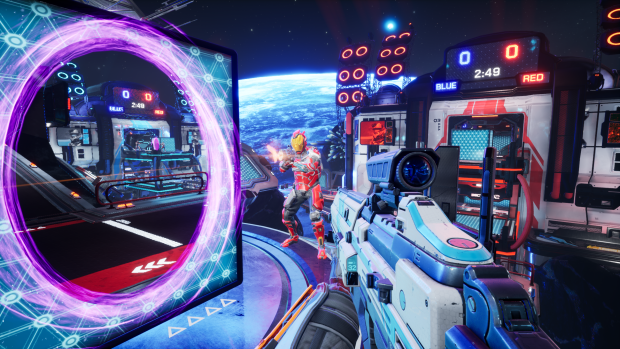What happens when you combine two of the greatest games, Portal and Halo, into one fast-paced sci-fi multiplayer shooter? You get Splitgate: Arena Warfare. The newly launched free-to-play game is now available on Windows PC via Steam. Developer 1047 Games says, “Splitgate: Arena Warfare evokes your favorite memories of the most-revered shooters of the past two decades, embracing the classic and familiar feel of arena multiplayer with a multi-directional twist. Splitgate: Arena Warfare’s world-bending portal mechanic lets players instantly create and link gateways around the map, encouraging and rewarding constant jetpack-boosted movement, strategic flanking and ambushes, and action that truly embraces all 360 degrees. It also looks really cool.”

What would a game like Splitgate: Arena Warfare be if you played it with the sound off? Not very exciting to say the least. The team tasked with making the action feel as real as possible, through the sound effects, was Los Angeles based game audio studio Hexany Audio. Through precise implementation, the team successfully added another layer of intensity to things like pistols, rail guns, rocket launchers and frag grenades making the final product interesting and enjoyable. To get a more in depth look at how all these effects were created, Hexany Audio’s Richard Ludlow and Kellen Fenton discuss their creative process below. Read the exclusive interview here:
How did you get connected with Splitgate: Arena Warfare?
Richard Ludlow: Our studio Hexany Audio was approached by the development team due to our experience with the audio middlware Wwise from Audiokinetic. Wwise is a middleware tool we specialize in and we knew we could make them a killer sounding game after seeing what they were working on!
Kellen Fenton: I was the lead sound designer on this project and this meant that my role was sort of two-fold. On one hand I was responsible for creating many of the key sounds in the game and coming up with the overall audio aesthetic while at the same time overseeing the rest of the sound team to ensure everyone was on the same page.
What was the most difficult sound effect to create for Splitgate: Arena Warfare?
Kellen Fenton: The assault rifle was a challenge because it’s the most common weapon in the game and its the one that people generally start with. Making it powerful enough to feel satisfying while ensuring that it doesn’t dominate the mix or overpower the other guns in the game was something that I wrestled with quite a bit.
On a game like this, where do you start? What was the first thing you did for this game?
Kellen Fenton: I started by coming up with a comprehensive list of all the sounds this game would need. It became very obvious that the weapons were the core pillar of the sound design work that would need to be done. I divided the weapons up amongst the sound design team here at Hexany and came up with the approach we would use to tackle them.
Splitgate: Arena Warfare was recently in Beta. Have you all made any modifications to the game since Beta? If so, what were they?
Kellen Fenton: At the time of the Beta we had done a bulk of the weapon design but the rest of the game was still using older temp assets. The time from beta to launch was spent fleshing out the rest of the game and applying the finishing touches to the weapons.
Richard Ludlow: The other thing about competitive games with a longer life like Splitgate is that we need to make sure we are balancing the game and addressing player feedback as it comes up post-release. Beta was a great chance to see what was working and what needed further refinement. We also have post-release improvements planned which will further refine the sound of the game.
How has this game been different to work on, then some of your other recent games such as Star Trek: Dark Remnant? Is the approach different?
Richard Ludlow: Working on something like Star Trek for an existing IP is awesome because it’s an established universe with an established sonic landscape. But with a new franchise like Splitgate, we get to take a different approach and re-invent the wheel sonically— so it’s a different kind of challenge.
Also on Star Trek, the experience is much more cinematic and we also handle things like music composition (with the help of our lead composer Matthew Carl Earl). In competitive games like Splitgate though, you don’t really want lots of in-game music since you’re focused on gameplay.
Kellen Fenton: Like Richard mentioned, in Splitgate, gameplay clarity is paramount. Ensuring that players are aware of what’s going on at all times was at the forefront of everything we did. The sound design has to provide the player with as much information as possible and the mix has to ensure that you’re always hearing the most important content.
A specific example of this is that we wanted to give players an audible indication of when they’re running low on ammo so they can plan their next moves. This usually takes the form of a ‘low-ammo rattle’ or ‘mech’ layer that fades in as the player begins to run out of ammo. Another examples is the positional ‘portal-threat’ indicators that you hear when an enemy is looking at you though a portal. Likewise we have positional bullet impacts that play when you get shot that not only grab your attention but also help guide you to where the threat is coming from.
There are parts in the game when a man says “killing spree”. Are you all responsible for incorporating those voices too? If so, whose voice was that?
Richard Ludlow: Our studio also handled the voice over / dialogue production for the game. So we don’t actually write any of the dialogue that’s being said, but we’re responsible for getting it recorded and produced and hooked up in-game. The developers had a great vision for the sound they wanted to capture with the announcer and how they wanted him to be different from other games. So we cast the voice actor, brought him into the studio, and then did some neat post-processing on his dialogue in-game.
A lot of people are describing this game as “Halo meets Portal”. Do you agree with this assessment?
Richard Ludlow: Splitgate is definitely its own unique game. Halo and Portal are awesome titles and I’ve seen people drawing parallels here, but Splitgate is by no means a clone of them. It takes inspiration from a lot of things and executes something we think is extremely addicting and fun.
Kellen Fenton: The thing that fascinates me about Splitgate is that it’s such a simple concept, a first-person shooter with portals, and yet it’s never been done before. I think the simplicity of it means it’s easy to learn but hard to master, making it approachable to newcomers while retaining a level of complexity that’ll keep people wanting more.



